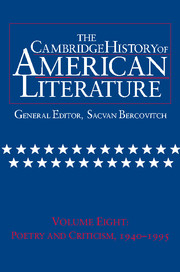Book contents
- Frontmatter
- Introduction
- Poetry, Politics, and Intellectuals
- Introduction
- 1 The Place of Poetry in the Culture, 1945–1950
- 2 Politics
- 3 Rear Guards
- 4 Avant-Gardes
- 5 Authenticity
- 6 Translation
- Conclusion: The Place of Poets, 1995
- Appendix I: Biographies of Poets
- Criticism since 1940
- Chronology 1940–1995
- Bibliography
- Index
3 - Rear Guards
from Poetry, Politics, and Intellectuals
Published online by Cambridge University Press: 28 March 2008
- Frontmatter
- Introduction
- Poetry, Politics, and Intellectuals
- Introduction
- 1 The Place of Poetry in the Culture, 1945–1950
- 2 Politics
- 3 Rear Guards
- 4 Avant-Gardes
- 5 Authenticity
- 6 Translation
- Conclusion: The Place of Poets, 1995
- Appendix I: Biographies of Poets
- Criticism since 1940
- Chronology 1940–1995
- Bibliography
- Index
Summary
Rear guard – who covets that designation? In the last fifty years only too many artists have claimed to be avant-garde. It would be easy enough for a poet to speak of meter as an aspect of technique that does or does not work for him or her, some of the time or always – Lowell sometimes explained his choices this way. But the adoption of metrical form in the years just after the war was more commonly taken as a sign of affiliation, and the predictable consequence was a War of the Anthologies in the 1950s. Certainly since 1960 free verse, the technical sign of experimentalist poets, has dominated verse writing. Yet a deeper truth about the postwar era is that it has been predominantly reactionary against the avant-garde experiments of the generation born in the 1880s. The reaction really began when Eliot and Pound returned briefly to quatrains in 1919; it continued in the work of Hart Crane, John Crowe Ransom, Allen Tate, and Yvor Winters in the late 1920s and the 1930s. Auden’s emigration to New York in 1939 reinforced this reaction, as he gained influence on young American poets through the 1950s. Immediately after the war, many poets did want to be known as rear guard. There was then an urgent desire among young poets to set the modernist generation off to the side, as though American poetry had never crossed with the international avant-garde, as though it were still English poetry.
- Type
- Chapter
- Information
- The Cambridge History of American Literature , pp. 56 - 82Publisher: Cambridge University PressPrint publication year: 1996

